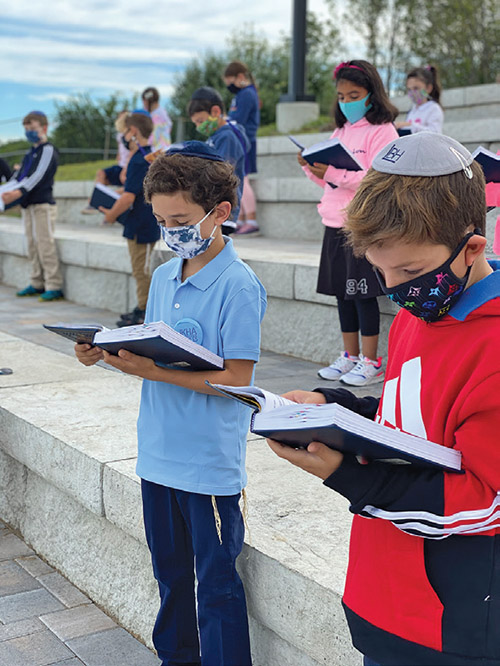

As communities across the world prepared to welcome 5781, synagogues were forced to adapt to government-imposed pandemic mandates as well as the science-based recommendations of medical advisory groups of their shuls and schools. In many areas, this meant tents instead of, or in addition to, indoor minyans, with masks and social distancing enforced.
Synagogues in the Northern New Jersey region, aware that some congregants would not feel comfortable attending shul due to COVID concerns, found ways to share the sweetness of the season by preparing and delivering care packages to their members. In Springfield, Congregation Israel sent challah and honey, and in Highland Park, Congregation Ahavas Achim sent apples, YU “Torah to Go” booklets and gummy fish (among other things). In West Orange, Congregation Ohr Torah also sent the “Torah to Go” booklets, along with a booklet of divrei Torah prepared by shul members and a honey cake.
Throughout the chagim, members of the different New Jersey communities took note of the different ways this Rosh Hashanah contrasted sharply with memories of previous years.
“Davening outdoors, socially distanced, in a Rosh Hashanah minyan with no children to manage, in beautiful weather, created a stark and much-appreciated change that allowed for the focus and reflection appropriate for this time of year,” said Ely Rosenstock of the Young Israel of East Brunswick. “Trying to instill that same feeling in my children without shul, however, is a near impossible task. I look forward to our entire family returning to shul together as one next year.”
“It was so meaningful to have four generations of our family together davening under one tent,” said Amy Vogel of Teaneck. “Generally this extended family, although all live in the Teaneck/Bergenfield area, all daven in various shuls. It was memorable that we got the aliyahs, led the davening, lained, blew the shofar and shared all the tefillot with our intimate group.”
Rachel and Joe David of Highland Park stated, “While we fully understand and respect the need for it, we were a little disappointed in the abbreviated service. We missed the usual singing and some songs that were omitted, especially since shul has been a different (and much shorter) experience for the past several months. Our kids, however, had a different view. Naomi loved that it was short because it allowed her to participate in the full service since it was abbreviated. She said that it wasn’t too long for a 7-year-old. She also loved davening outside, and I’m with her on that. Our son Judah had a hard time with no youth groups during davening. He was home with a babysitter and felt out of the loop. He was appreciative of all the davening options that ensured he wasn’t left home for too long.”
“In normal years, we have managed to squeeze in people who decide to attend our services at the last minute, and even occasionally welcomed walk-ins,” said Rabbi Daniel Geretz of the Maayan Minyan of West Orange. “What was most different, and heartbreaking, this year, was having to say ‘no’ to people because we did not have enough space to distance people safely.”
Yosef Golubchik of Highland Park noted how very emotional the tefillah was in his shul, Ateres Shlomo. “Particularly during U’nesaneh Tokef, the piercing cries from the baal tefillah, women in the ladies section weeping, and men sobbing from all over, when the chazzan barely made it through the words mageifa and all the other iconic phrases.”
Perry Bell, a psychologist in Morristown, commented: “I recognized as the new year started that despite challenging times, people are resilient as ever to make shul happen in whatever form that works. In my own family, we’ve been able to use Zoom to come together before Yom Tov from all over to share in the chag, something we never would have even thought to do prior!”
Nathan Zemel, a practicing physician who lives in Newark and helps to provide Hatzalah services around the region, remarked, “COVID caused me to attend Rosh Hashnnah services outside my usual venue. I attended a program at the Robert Treat Hotel in Newark that was composed of two collaborating groups—Our Place and Chabad. We socially distanced and wore masks. I enjoyed the services and made many new friends.”
Rabbi Chaim Poupko, rav of Congregation Ahavath Torah in Englewood, spoke to NJ Advance Media, the parent company of the Star Ledger and nj.com, in a pre-Yom Kippur news story published Sunday, Sept. 27, and noted how unusual it was to blow a shofar covered with a mask held in place by a rubber band. “The feeling is that a shofar, like a trumpet or something else, is a superspreader [of the coronavirus].” In the same news story, Rabbi Andrew Markowitz of Shomrei Torah in Fair Lawn said, “This year, everything is changed, from the prayer book to the seating…I’d say almost every detail.”
Rochel Chemtob of Passaic observed, “I found it striking that these days it’s a question of if and how we can go to shul for the Yamim Noraim. If one would’ve been told this just a year before we would never have believed it… It’s a powerful lesson that Hashem can, and does, do anything in the blink of an eye.”
“For many people, Rosh Hashanah looked very different this year,” said Jeffrey Kigner, president of Congregation Israel of Springfield. “At our shul, we were fortunate enough to safely host many of our members davening back together b’tzibur, under the guidance of rabbinic and medical professionals, while adhering to all state guidelines. The shul also coordinated an outdoor shofar blowing in a local park for families of all ages and supported numerous acts of chesed performed by members of the community for one another to ensure simchat hachag for all.”
By Harry Glazer
�









